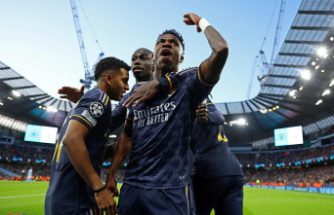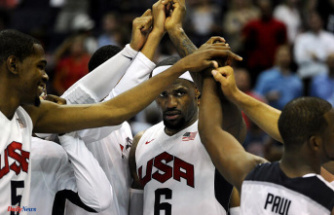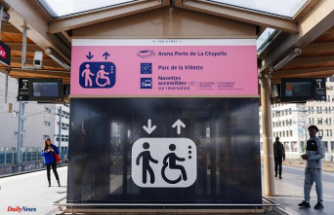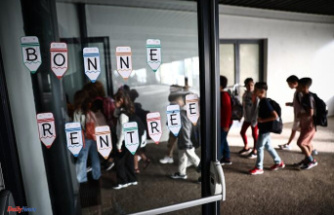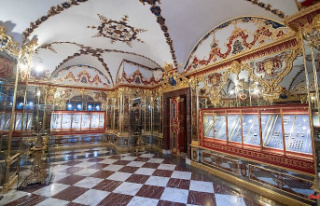Nobody really needs the game for third place? Not correct. The other World Cup is taking place in Asian Town, away from the glitter and wealth of Doha. Migrant workers live Croatia-Morocco more genuinely and originally here. In the end, even Qatar's biggest party takes place, but big misunderstandings remain.
The question is legitimate: Why is there a game for third place at the World Cup at all? Normally fans don't care about the game and the teams themselves don't feel like losing the semifinals. The answer is: for evenings like this in Asian Town near Doha.
In fact, Croatia and Morocco want that third place - and the people of Asian Town want that game. The other World Cup takes place in the local cricket stadium. Away from the glitter. From magnificent arenas. From current and former football superstars on the pitch and in the stands. From "Metro-This-Way", from bombastic party music, from tourists who have arrived.
About 2,500 migrant workers sit on the field and in the stands. Actually only men. They have no opportunity to participate in sparkling life in Doha, they are too poor and cut off from the rest of society. They live in the ghettos of Asian Town and the Industrial Area in sparse blocks of flats. Crowded together in small rooms. The cricket stadium is where they come together to take part in the tournament they created. It is a parallel world that tacitly shows the class world of Qatar.
But the migrant workers love football, although for the most part they don't know anything about the sport. Dealing a lot with football, watching Premier League games on streaming services, leafing through specialist literature or even attending games in the stadium are privileges that they do not have. But that doesn't matter. They celebrate the event, celebrate what's going on in their area. And that makes you happy. Far more than at crowded Coca-Cola fan festivals, where Ballermann, après-ski and Oktoberfest (without the alcohol, of course) come together. FIFA still has a hand on this. It's an official fan zone, but security here is less intrusive, just briefly checking pockets. Probably no one would think of carrying out an attack here.
It's windy in the stadium. Many of the workers have hoods pulled over their faces. Hats are seen in Qatar for the first time. That's because there aren't any concrete buildings hundreds of meters high out here that stop everything and everyone. Even the wind. But the fresh breeze doesn't spoil the mood. Right at the beginning there is wild cheering and screaming. Croatia submits, Morocco responds promptly. The Atlas lions clearly have the fans on their side here.
Hawkers walk through the rows offering popcorn, snacks and drinks. Old escape lighting poles illuminate the cricket stadium, revealing the small football pitches and on-pitch entertainment venues. Other spectators sit in front of the concrete bowl on long beer benches or in wooden crates. Everywhere the game is broadcast with English commentary. There is little going on at the food stalls. The FIFA panacea VISA is not accepted there. Cash is king here. There are different starting points for each population group: South Indian, Filipino, Arabic, Hyderabadi, Neapli, Indian
At half-time, Croatia leads 2-1. The wonderful goal by Mislav Orsic was only applauded with restraint, also because numerous spectators flocked to the exit minutes before the break whistle. They leave the site to do their jobs, to at least get some sleep before everyday life catches up with them one last time. An announcer appears on stage, happy that Croatia is leading and Morocco still has a chance to win. She speaks several languages, is from India and is one of the few women on the entire site.
Denis from Kenya is also among those who no longer notice the half-time show. He spent the World Cup as a security guard at one of the team hotels. He will fly back to Mombasa in the next few days and will have earned 2,300 riyals, around 600 euros. A small fortune in Kenya, he says, and invites you directly to the port city in East Africa. Like the rest of the well over thousands of Kenyans who worked in Doha during the tournament, he got paid for his flights, food and his visa, he says. Before the tournament, he undertook rapid training to become a security guard. During the tournament, he was part of the Faceless Army, who ensure that everything runs smoothly.
With great interest he asks about Europe and how to get there. "Do you have green cards?" he asks, saying that he doesn't want to arrive as a refugee. "How do you live in Europe? And how cold is it there?" asks Denis, unable to believe that it stays dark above the Arctic Circle in winter and that even in Germany the temperatures drop below zero. Nevertheless, he wants to go there and wants to get away from Qatar, the country that offered him a short-term job opportunity but deprived him of all freedom.
With Denis it is only a few weeks, unlike with Rupal, a guest worker from Nepal. The 24-year-old has been working as a cleaner in one of Doha's hospitals for four and a half years. uninterrupted. "The whole time I wasn't allowed to take vacations, but now I'm going to fly to visit my parents for the first time." He has to beg his company for it, he says almost casually. Rupal's father and mother have a small farm in Nepal, "but only for their own food, not for sale". After school, he had no job opportunities himself and, like so many before and after him, headed towards the desert state.
Rupal is a big football fan and still dimly remembers Germany's World Cup victory in Rio 2014, even though the sport is not very common in Nepal. Today he wants Croatia to win. Modric is his favorite player. The 24-year-old would have liked to see the Croatians in the final against France, but now the Équipe Tricolore will win the title because he likes Mbappé. But Ronaldo is even better. Rupal can't understand why some people hate "this amazing player" so much. He would have wished for the final and was devastated when CR7 was eliminated.
Rupal didn't notice the World Cup hustle and bustle in the glittering world of Doha. "It's also far too expensive." Here and there he has visited the cricket stadium for the matches, "but often the matches were played too late". The Nepalese always works the early shift and has to go to bed at 10 p.m., when the important duels for prime time in the European market have kicked off. So did many of his friends. He made an exception in the semi-final between France and Morocco. "I only slept for three hours," he says gleefully. Four of them live in a small room in Asia Town.
When Morocco is beaten and rages against the Qatar referee, the lights in the stadium go out. An Indian singer takes the stage with her band dressed like a 1970s rock formation. In just a few minutes, the Cricket Stadium becomes the city's largest disco. Everywhere they dance to the rousing sounds, let go and rise in the moment. In these moments, those without a voice in Qatar are regaining their humanity. It's one of those contradictions of the tournament. Even migrant workers can laugh and laugh. Migrant workers can dance too - and they show it. Shades of gray mingle with the black and white of ready-made opinions everywhere in Qatar.
Here in the darkness of the cricket stadium and not on the artificial entertainment miles in the glittering facades of Doha the other World Cup is played. It seems more real, more full of life and more original, and yet it is based on one of the great grievances of the tournament. At the exit, one of the Asian workers puts his arm around another's shoulder. He is wearing a Qatar track jacket.


